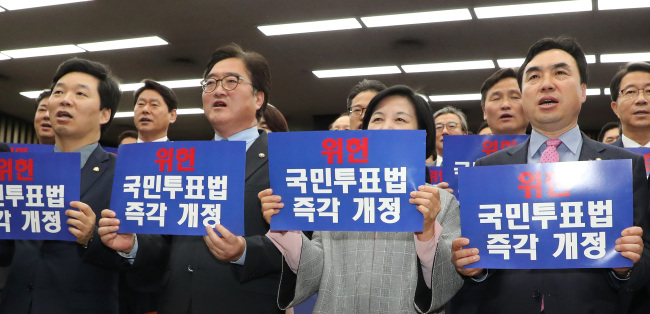This month’s parliamentary session came to a standstill for the second week in a row on Monday, as rival parties continued to clash over contentious bills including the long-pending broadcast laws and revision of the Constitution.
Ruling and opposition parties failed to narrow differences during a breakfast meeting, cancelling the plenary session initially scheduled for later in the day. The session was also cancelled last week for the same reason.
The cancellation of Monday’s plenary session also called off Prime Minister Lee Nak-yeon’s speech on the supplementary budget of some 4 trillion won ($3.7 billion) to create more jobs for young Koreans. During the scheduled speech, Lee was also going to highlight the need to allocate extra budget to aid regions that have been affected by the restructuring of corporations.
 |
Members of the ruling Democratic Party call for the revision of the Referendum Act, which was ruled unconstitutional in 2014. (Yonhap) |
The ongoing feud between the parties bodes ill for the Moon Jae-in administration’s hopes to hold a referendum on constitutional amendment on June 13 concurrently with the local elections.
Unless the Referendum Act, which was ruled unconstitutional in 2014, is revised by April 23, the Moon administration won’t be able to gather public opinion on amending the Constitution in June.
The Moon administration, as well as the ruling Democratic Party, aims to revise the Constitution so that the current single five-year presidency can be changed to a maximum of two consecutive four-year terms. The main opposition Liberty Korea Party, however, calls for a system that allocates more authority to the prime minister, who would be appointed by the National Assembly.
Opposition parties, including the Liberty Korea Party and the Bareunmirae Party, have been also calling on the ruling Democratic Party to approve a revision to the nation’s broadcast laws, which partially deprives the president of his or her authority to select and appoint the heads of public broadcasters. The ruling party has been insisting that the reform proposal needs “additional reviews” before being approved.
The two opposition parties have been boycotting legislative sessions since last week as a way to push for the reform of the current broadcast laws, which, according to some experts, have been severely damaging editorial independence of public TV and radio programs here.
By Claire Lee (
dyc@heraldcorp.com)







![[Today’s K-pop] Blackpink’s Jennie, Lisa invited to Coachella as solo acts](http://res.heraldm.com/phpwas/restmb_idxmake.php?idx=644&simg=/content/image/2024/11/21/20241121050099_0.jpg)
